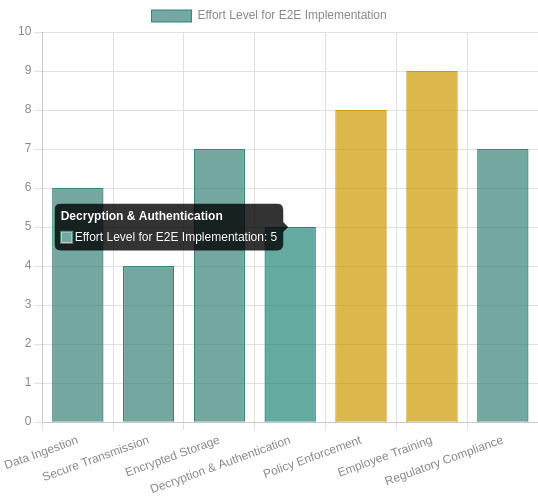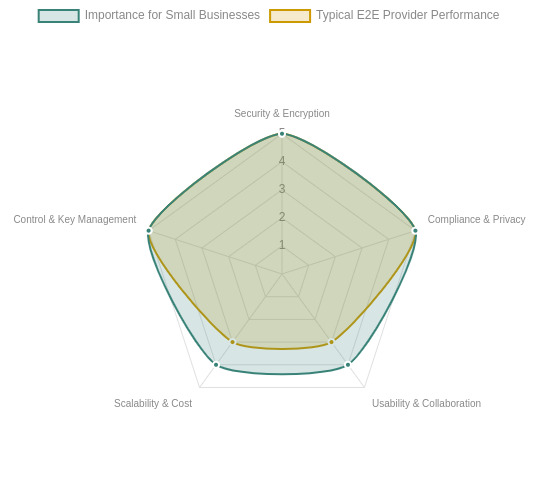These days, with everything online, the information your small business handles is absolutely vital. From customer lists and financial reports to your unique business ideas, the amount and sensitivity of this data just keep growing. Keeping it safe isn’t just about security; it’s about holding onto your customers’ trust, following the rules, and ultimately, making sure your business has a future—and a better one. Here we are going to break down “End-to-End Storage Technology” and show you why it’s not just some tech jargon, but something truly essential for small self storage businesses.
Key Things to Know for Keeping Your Data Safe
End-to-End Encryption/(E2EE) is super important: This means your data gets scrambled on your device and stays scrambled to ensure infallible security even when it’s stored or sent somewhere else. Only people with the right ‘key’ can unlock it, which keeps everything really private and secure.
Protecting Data Through Its Whole Life: ‘End-to-End Storage’ isn’t just about where you save your business related digital files. It’s about having a smooth system that looks after your data from the moment you create it until you need to get it back, covering every step along the way.
Mixing and Matching Solutions: Small businesses can use a mix of options like cloud storage with E2EE, local storage devices (like a NAS), or even a combination of both. This helps them find the right balance between how easy it is to get to their data, how much control they have, the cost, and having backups.
So, What Exactly is End-to-End Storage Technology?
Basically, the End-to-End technology to secure the data and if applied to the storage world it works the same way from beginning to the end is being used these days which is very effective. Think of it as one big system that keeps our data safe, organized, and ready to use from the second we create it until we need that for various reasons to pull it up. This whole setup makes sure your data is always protected and there when you need it, no matter where it is or what you are doing with it.
A really important part of this “end-to-end” idea is something called End-to-End Encryption (E2EE). This fancy security step means your data gets scrambled right on your device before it even goes anywhere, and it stays scrambled while it’s sitting in storage or traveling across the internet. Only the person who’s supposed to see it, and who has the special key, can unscramble and read your information. Because of this “zero-knowledge” approach, even the company storing your data can’t peek at your files. That gives you a much higher level of privacy and protection.
Today’s storage tech really focuses on making security and efficiency work together seamlessly.
Why End-to-End Storage is a Game Changer for Small Self Storage Businesses

Small self storage businesses usually don’t have huge budgets, but they often deal with a lot of sensitive information. For instance if someone owns just a few self storage units just a single data breach can really hurt them financially, damage their reputation, and land them in legal trouble if data about their customers gets leaked to someone who wants to harm them or gets on other parts of the internet for mean activities. That’s why using end-to-end storage technology is such a strong defense and offers so many smart benefits:
Top-Notch Security and Privacy
E2EE keeps the self storage data safe by encrypting it not just when it’s moving around, but also when it’s just sitting there. This means the important data of business is protected from hackers, people trying to snoop, and even from employees at the company working on storing that data. When you control your own encryption keys, you get to decide exactly who can see your information. That’s super important for sensitive client details and your self storage business’ secret sauce.
Easier Compliance and Following the Rules
Regulatory compliance is very fundamental to keep the self storage business running uninterrupted and that’s what ensures its smoothness. Lots of industries have strict rules about data protection, like GDPR, HIPAA, and other local privacy laws. End-to-end encrypted solutions make it much easier to follow these rules because they keep your data private and under your control. Taking this step ahead of time helps you avoid expensive fines and builds trust with customers who are becoming more and more aware of their data rights.
Enhanced Business Continuity
Secure, well-managed data is fundamental for business resilience. With end-to-end storage solutions, automated backups and recovery mechanisms are often built-in, ensuring that your business can quickly recover from hardware failures, natural disasters, or ransomware attacks. This minimizes downtime and protects your operations from unforeseen disruptions.
Cost-Effectiveness and Scalability
The modern end-to-end storage solutions, particularly cloud-based ones, offer flexible pricing models for all of them. This allows small businesses to scale their storage capacity as needed, paying only for what they use.
This also eliminates the need for large upfront capital expenditures on hardware and reduces ongoing IT maintenance costs, making enterprise-grade security accessible.
Diving Deeper – How E2EE Protects Your Data
The magic behind E2EE lies in its cryptographic patterns that typically employs asymmetric (public-key) encryption, where users have two keys—a public key shared openly and a private key kept strictly confidential which is deeply layered and cannot be decrypted by any method or chance. This process works as when the data is sent or stored, it’s encrypted using the recipient’s public key. Only the recipient, with their corresponding private key, can decrypt the information. This architecture infallible at all levels and ensures that even the intermediate parties such as cloud providers, cannot read your data even if their systems are compromised.
Comparing Storage Options – Cloud, NAS, and Hybrid Approaches
Picking the right end-to-end storage solution really comes down to what your business needs, your budget, and how sensitive your data is. Here’s a simple breakdown of your main choices:
1- Cloud Storage with E2EE
Today with the advent of AI cloud storage is a great choice if you need to get to your files from anywhere, work with a team, and don’t want to manage your own hardware. There are tons of companies that offer strong E2EE cloud storage, so your data stays secure even when it’s on their servers.
SOME OF THE PARAMOUNT BENEFITS
- Grows with you – If needed one could add more storage space as your business gets bigger
- Access from anywhere – The owner can access files from any device, which is perfect for remote work.
- Saves money on hardware – It removes the need for buying or maintaining any expensive hardware or equipment
- Keeps your data safe – These services usually have great backups to prevent you from losing files
Network Attached Storage (NAS)
A NAS is like having your own private cloud right in the self storage owner’s office, connected to its network. It’s a fantastic option if you need fast access to big files, want total control over your data, or have spotty internet. There are many popular options available these days offered by various brands like Synology and QNAP make powerful NAS devices that you can set up with encryption.
Its Benefits For Small Self Storage Business Operators
- Accessibility – It’s quicker for moving around large files
- Control – You own the hardware and have the final say over your data
- Data Security – The information never leaves your office, which can be important for meeting certain rules
- One Time Payment – After you buy the device, the only real costs are for power and general management
3 – Hybrid Setups
A hybrid set up is an other great option for small self storage operators it provides the best of both options. The operators could You can use a local NAS for speed and control over your everyday files, and then use an encrypted cloud service as a backup for disaster recovery. This gives you a great mix of performance, security, and peace of mind.
Benefits of Hybrid Setups
- The best performance – We can use a local network for files you need all the time and the cloud for backups
- Extra layers of safety – You have multiple copies of your data, keeping it safe from loss.
- Flexible for your needs – You can set it up in a way that makes the most sense for your business.
Key Things to Look For in a Storage Provider For Self Storage
When choosing a storage solution for your small business, it’s easy to get fixated on the amount of storage space offered as we might get overwhelmed like most of the new people do. The fact is–a truly effective storage strategy goes far beyond GBs and TBs of storing capacity. To make this a smart move and valid investment, we need to evaluate solutions based on security, usability, and how well they fit into the specific business needs. What I meant by saying that is a successful transition to a new storage system is best handled through a deliberate, step-by-step process. We can start that by taking a close look at it. Before you can pick the right tool, you need to understand what you are working with. Like figuring out which of the self storage unit files are highly sensitive, like financial records or client information.
Take stock of any regulatory requirements you need to meet, such as GDPR or HIPAA, and consider how frequently different kinds of data are needed. This initial assessment is the foundation of your entire storage strategy, guiding every decision you make.
Clarity is a very important aspect here to be considered and once we have things clear and sorted of data landscape, we can begin researching potential providers. Look beyond the marketing claims and compare their core features, pricing structures, and, most importantly, their dedication to end-to-end encryption (E2EE). Some top options available online these days are likes of Proton Drive and Tresorit or network-attached storage (NAS) from brands like Synology, your goal is to find a provider that aligns with your security needs and business priorities as their prime priority.
Before committing to a company-wide rollout, it’s highly advised for everyone and wise to run a pilot program first. It may sound unnecessary, boring or pointless but knowing problems before they actually happen is a deal breaker. So, select a small, representative team to test the new system in a real-world setting. Have them try out essential tasks like daily workflows, sharing files with clients, and restoring from backups. This trial period would prove entirely invaluable for catching potential issues and gathering feedbacks on various stages, allowing us to fine-tune the setup and ensure a smooth transition for everyone else.
Make sure your the team working on these projects understand how to use the new system correctly, with a strong emphasis on security best practices. This includes using encryption features properly and following secure protocols for sharing sensitive information. Solidify this training by creating clear, written policies for data storage, access rights, and how encryption keys are managed.
This radar chart below offers an opinionated comparison on a scale of 1 to 5, where 5 is excellent.

Points To Consider….
Thinking about the long-term health of your storage strategy is just as important as the initial setup. To ensure your solution remains effective and adaptable, it’s wise to anticipate and avoid a few common challenges.
First, be aware of the technical hurdles. Managing self storage encryption keys is a major responsibility; if you lose the keys, you lose your data forever, so a strong backup and recovery plan is essential. Additionally, while modern tools are efficient, encryption can sometimes slow things down. It’s important to choose a solution that is optimized for performance to prevent frustrating delays.
Next, consider the details of the service itself. Some providers may encrypt your files but leave metadata—like file names and when they were accessed—exposed. Always verify exactly what is being protected. Finally, avoid getting trapped by your provider. Make sure you can easily export and move your data to a different service if you need to in the future, giving you the flexibility to adapt as your business needs change.


